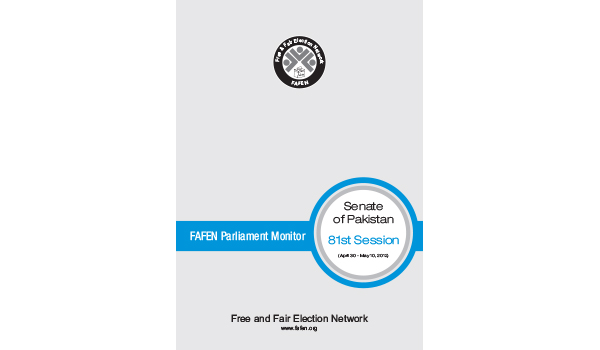ISLAMABAD, May 11, 2012: Protests and walkouts by opposition parties and coalition partners interrupting regular proceedings, and low attendance of Senators marked the Senate’s 81st session, leaving 54% of the agenda items listed on the Orders of the Day unaddressed, says a Free and Fair Election Network (FAFEN) preliminary report on Friday.
The session lasted 23 hours and 10 minutes for nine sittings from April 30 to May 11, on average meeting two hours and 34 minutes per sitting. Each sitting started with an average delay of 41 minutes.
In all nine sittings, PMLN Senators staged walkouts over the Supreme Court verdict in the contempt case against the Prime Minister. On three occasions JUIF protested over provincial autonomy, drone attacks and reopening of NATO supplies.
The allies of the government in the Upper House also staged walkouts. MQM and ANP walked out of the House over the issue of provincial autonomy while the PML protested over power outages and ministerial absence. During the eighth sitting the PML even threatened to quit the coalition if the energy crisis was not solved.
These protests and walkouts disrupted the proceedings and consumed 34% (478 minutes) of the session time.
Since the Senate Secretariat does not make the attendance record public, FAFEN conducts a headcount of Members at the beginning and end of each sitting and documents the actual time spent on the floor of the House by Chairman, Deputy Chairman, Leader of the House and the Leader of the Opposition.
On average, only 10 Senators were present at the outset and 23 at the end of each sitting.
The Leader of the House attended all the sittings and the Leader of the Opposition was present during seven sittings for 35% (493 minutes) of the session time. The Chairman chaired the proceedings for 73% of the session time; the Deputy Chairman 17%; and the remaining 3% of time was presided over by Members of Panel of Chairpersons. A total of 102 minutes (7%) were consumed by breaks.
The Parliamentary Leaders of PML and NP did not attend the session while the parliamentary leader of ANP attended nine, JUIF and PMLF six each, and BNPA leader attended one sitting.
Although the Quorum was visibly lacking at various stages of the session, it was pointed out once by an ANP Senator during the seventh sitting. The Chair rung the bells for five minutes, but due to persistent lack of Quorum the proceedings remained suspended for 52 minutes.
Twenty Points of Order consumed 11% of the total session time – 149 of 1,390 minutes. None of the Points of Order attracted the Chair’s formal ruling. Unless the Chair gives a formal ruling on a Point of Order, it does not lead to any output.
Though the session was called to debate the President’ s address to the joint session of the parliament in March, only 202 minutes were spent on the debate.
The Upper House passed the Medical and Dental Council (Amendment) Bill 2012, while four Private Members’ Bills were introduced and sent to their respective Standing Committees.
Thirty-eight out of 91 Starred questions (requiring oral replies) appearing on the Agenda were taken up by the House. On average four questions were asked per sitting. Additionally, 64 Supplementary questions were raised.
Two out of five Calling Attention Notices appearing on the Orders of the Day were taken up by the House. The CANs were moved by 11 Senators – seven belonging to the ANP, three to the PPPP and one to the PMLN. The taken up notices were about “the steps taken by the Government for implementation of clause 3 of Article 172 of the Constitution of the Islamic Republic of Pakistan” and “the steps taken by the Government in respect of the breakdown of electricity generations and distributions in Karachi by KESC and also its policy of mass retrenchment”.
Three out of 12 Resolutions appearing on the Agenda were adopted by the House. Two Resolutions were adopted to condemn the burning of Quran by an American pastor, and another to condemn the bomb blast near Amjal Khattak’s mausoleum.
For complete report click here
FAFEN is a network of 42 civil society organizations working to foster democratic accountabilities in Pakistan. It is governed by Trust for Democratic Education and Accountability.









